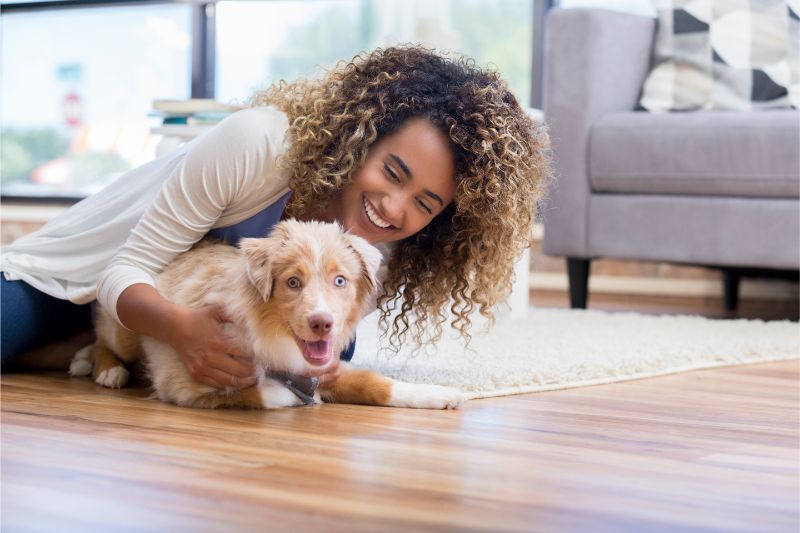The Do’s and Don’ts of Dog House Training

Bringing home a new puppy is one of life’s great joys, but the prospect of potty training your newest family member can be daunting. Even adult dogs can experience some setbacks when it comes to proper elimination, whether they are recently adopted or you’ve raised them from puppyhood.
At Lone Tree Veterinary Medical Center, we’ve seen a lot when it comes to the challenges of house training our dogs. So, with the help of our on-staff professional dog trainer, we’ve put together a few tried and true tips to help you navigate a smooth and stress-free transition with your special companion.
Schedule, Schedule, Schedule
House training should begin the moment you bring your pup home. Much like children, dogs of all ages do best when there is a predictable, daily routine in place. Use scheduling to your advantage when it comes to house training:
- First thing each morning and at regular intervals throughout the day, bring your dog outside to the same spot, as the smells of previous urine and feces can act as a trigger.
- Repeat this process every 2 to 3 hours when your pup is between 8 to 10 weeks old, every 3 to 4 hours when between 10 to 12 weeks old, and every 4 to 6 hours when 12 weeks or older.
- Offer your pup’s meals at the same times each day, and remove uneaten food after 15 to 20 minutes.
- Most puppies will need to eliminate immediately after a nap and within 5 to 20 minutes after eating (for dogs in general), so bring your dog outside to its special spot promptly after naps and meals.
- Always supervise your dog when outside and praise warmly each time it completes the task! By positively reinforcing the behavior you want, your dog will get the right message.
- Use a designated word for elimination, such as “go potty”, that lets your dog know what you expect it to do, and say it each time you take your dog out. Always offer your “good potty” praise when the task is completed.
- Take your dog out as late as possible before bedtime. Be prepared for at least one or two middle of the night trips outdoors for a new puppy during the first couple of weeks or until it is able to make it until morning.
- Cleaning up with an odor neutralizer after your dog has had an indoor accident is a must. Never use ammonia, vinegar, club soda, rug cleaners or detergents, as these products do not remove odor. You might not be able to smell it, but your dog will. We recommend using a pet-specific product (such as Urine Away), which safely eliminates the urine odor on carpets, rugs and floors, and leaves a pleasant scent. We carry this product in our lobby retail store.
- If you are regularly away from home for long periods of time each day during the house training phase, hire a dog walker or ask a family member, friend or neighbor to stop by and take your dog outside. This decreases the chances of accidents and will make the house training process more consistent and successful.
Consider the Crate
Unfortunately, dogs aren’t born with the desire to eliminate outdoors, but they do inherit the desire to eliminate outside their “dens” from the mother dog. Crate training can be a useful tool in a puppy’s early days, as most puppies will adapt quite well to the security of the crate and won’t want to eliminate inside it. Likewise, confining your puppy to a small room or area of the home is also effective in early house training.
Dog House Training No-No’s
In order to avoid stalling the process and creating “issues” around elimination, stay away from the following tactics:
- Never punish your puppy or dog for an accident inside the home. This only creates a negative association with eliminating and disrupts the bond between you and your dog. Instead, bring your dog outdoors to its designated area. Use your “go potty” word to signal what should happen there, and always offer your “good potty” praise when the task is completed.
- Try to avoid over-reliance on house training “crutches” such as doggie diapers or pee pads. These can turn into habits that are tough to break for a dog that is physically able go outdoors to eliminate.
Practice (and Patience) Makes Perfect
Remember that dogs have evolved for thousands of years alongside humans, and are very attuned to our emotions and energy. Remain calm and upbeat throughout the house training process and, whatever you do, don’t give up!
Sometimes underlying medical issues are at play when it comes to difficulties with house training a dog. If you’re having trouble, please contact your team at Lone Tree Veterinary Medical Center. We can help to make sure that your dog is healthy and provide you with further strategies for success.



